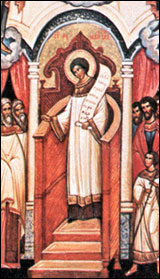|
On October 14th (the 1st by the old calendar), together with the feast of the Protection of the Holy Virgin, the Church commemorates Saint Romanus the Melodist, who was closely tied with the city of Constantinople, where the event celebrated in the feast of the Protection later took place.
|
|
St. Romanus lived in the second half of the 5th century and came from Syria. From early childhood he led a pious and God-fearing life. At first he served as a sacristan in one of the churches in Beirut, but later moved to a similar position in Constantinople. Here he spent all his time fasting and praying, often spending the whole night in prayer. Afterwards he was appointed a sacristan at the marvelous church of St. Sophia, which was the city’s major cathedral. St. Romanus was illiterate, but he applied himself fervently to the doing of good deeds, for which he earned the affection of Euphemius, the Patriarch of Constantinople. Seeing how diligently St. Romanus worked for the church and how earnestly he performed his job, the Patriarch began to remunerate him on an equal basis with the church readers and singers. However, the latter began to grumble against the Patriarch, saying: “You have placed an ignoramus on a par with us!” They began to hate St. Romanus and to intrigue against him.
|

Saint Romanus the Melodist |
|
Once, on the eve of the Nativity of our Lord, when the king himself came to church, the readers seized St. Romanus, who was lighting the candles at that time, and pushed him towards the ambo, saying: “Since you are being rewarded equally with us, – then go out on the ambo and sing a song of praise to God, just as we do.” They acted thus out of envy, wishing to embarrass St. Romanus, knowing full well that he was illiterate and did not know the Holy Writ well enough to compose a sacred song, nor did he know how to sing. After suffering such humiliation in front of the king and all the people, St. Romanus felt greatly ashamed and cried bitterly. When the service ended and everyone left the church, he fell on his knees before an icon of the Mother of God, and tearfully prayed to Her for a long time. After-wards he went home and out of great sadness fell asleep. And then the Holy Virgin appeared to him in his dreams, holding a small scroll in Her hands and ordering him to swallow it. St. Romanus swallowed the scroll and immediately woke up. His heart was filled with great sweet-ness and spiritual joy, while in his mind he felt the grasp of knowledge. In a single moment his mind was filled with great wisdom, and he began to thank the Theotokos for giving him more knowledge in one instant than he could have acquired over the course of many years.
When the time came for the all-night vigil to begin, St. Romanus went to church, rejoicing in the grace which had been accorded him by the Holy Virgin. As the moment arrived to sing a canticle in honor of the feast, St. Romanus stepped onto the ambo and with a sweet voice began to sing a kontakion (sacred song) which he had composed in his mind: “Today the Virgin giveth birth to Him Who is transcendent in essence, and the earth offereth a cave to Him Who is unapproachable. Angels with shepherds give glory; with a star the Magi do journey; for our sake a Young Child is born Who is pre-eternal God.” (This sacred song has become the accepted kontakion for the feast of the Nativity of Christ.)
All the faithful who were present in the church were amazed and delighted by St. Romanus’ singing, particularly as they grasped the meaning of his words. When St. Romanus finished his sacred song, the Patriarch asked him, – how did he attain such wisdom? St. Romanus then openly told everyone about the miracle that had occurred to him, and gave glory to the grace of the Holy Virgin. Hearing all this, the church readers who had offended him became ashamed and fell at his feet in repentance, asking his forgiveness. The Patriarch then immediately ordained St. Romanus a deacon, and from the latter’s lips poured forth such a fountain of wisdom that those who had previously mocked his illiteracy were now themselves forced to learn from him.
St. Romanus composed over a thousand kontakions and ikosy (i.e. canticles in honor of holidays and saints, which describe the essence of the holiday) for the various feast days of the Saviour and the Mother of God, and in honor of many saints. The Church has named him “the Melodist” and has acclaimed him as the best writer of sacred songs, not only for the wealth of ideas contained in them, but also for their poetry, depth of feeling and sublimity of language. St. Romanus is also considered to be the patron saint of church choirs and singers.
|